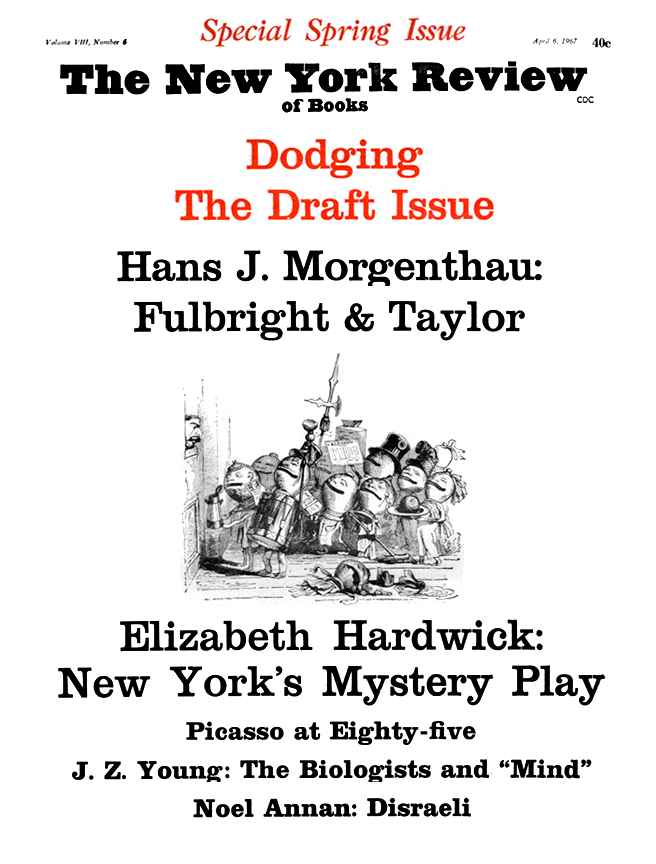In response to:
Our Man in the Eighteenth Century? from the March 9, 1967 issue
To the Editors:
F. W. Dupee gives a superb account of Willard Trask’s translation of Casanova’s History of My Life [NYR, March 9]. It may seem pedantic to note an error (p. 4, last column, first paragraph): Mr. Dupee writes “This poisoned happiness, as we know from other passages in Confessions, consists in his associating women with his dead mother to the extent of wanting to be at once loved and punished by them—literally, perhaps, beaten by them.”
While there may indeed be inferences of this sort to be drawn from Rousseau’s elaborately simple accounts of his love life, the source of the sour-sweet enjoyment is definitely not the thought of his mother (whom Jean-Jacques had never known): Mademoiselle Lambercier, sister of the minister with whom the boy lived for some time, noticing the evident pleasure with which he received his corporeal punishment, found it necessary to discontinue the method. Rousseau is quite explicit on the masochistic tendency in him: “Long tormented without knowing by what, my ardent glances devoured beauteous persons; my imagination recalled them to me ceaselessly, only to have them operate after my fashion and to make just so many misses Lambercier of them.”
Konrad Bieber
Connecticut College
New London, Connecticut
F. W Dupee replies:
My apologies to Mr. J. Rives Childs for misrepresenting his nationality. With such a gaffe on my record, no institution will ever invite me to be scholar in residence. I am, however, well acquainted with his book, Casanova, A Biography Based on New Documents (London, 1961). On page 172 of that book he writes: “Pursuing the paths opened by M. Samaran’s researches, information has been uncovered indicating that Henriette may well have been Jeanne Marie d’Albert de St Hippolyte…” Here as elsewhere in his book Mr. Childs’s addiction to dangling participles (“pursuing…information”) is misleading. What he seems to mean is that the “information” in question was uncovered by himself. Where I erred, then, was in attributing the work of identification wholly to M. Samaran and failing to make it clear that Mr. Childs shares the honors. I am sorry to have to use the word “honors” in an ironic sense. Interested readers can easily discover for themselves whether such irony is justified. They should consult the pages (172-173) in Mr. Childs’s book devoted to identifying Henriette; also the page (53) about Ismail Effendi and Constantinople; also pages 80-84 where the identity of M.M. is discussed (M.M. is the deliciously lubricious Venetian nun who makes her chief appearances in volumes 6 and 7 of Casanova’s Histoire de ma vie.) Speaking for myself, I have rarely encountered so much strenuous juggling with names, dates, places, and logic as occurs in these passages. They remind me of old tomes that argue for the historicity of Jesus. This is not to say that Mr. Childs’s researches are negligible as a whole; they aren’t negligible. It is only that he has a very soft spot in his heart for what he calls, in the case of Henriette, “a tempting hypothesis.”
As for Mr. Bieber and Mlle. Lambercier: if space had permitted, and if my main subject had been Rousseau rather than Casanova, I would certainly have brought Mlle. Lambercier into the picture. In the Confessions, Rousseau’s boyhood attachment to her does figure as the earliest recorded instance of his “masochistic tendency.” But my leaving her out was not exactly an error; it signified a slightly different understanding of Rousseau’s psychology on my part. As I see it his “sour-sweet” attachment to Mlle. Lambercier was more of a symptom than a cause, especially when that attachment is viewed in the light of his relations with Mme. de Warrens, whom he called “Mamma” and whose determination to share her bed with him induced in Rousseau feelings of revulsion which he explicitly describes as incestuous (Book V). Come to think of it, Mlle. Lambercier did get into my picture, although anonymously. Hers were the backsides accidentally bared to the King of Sardinia—a phenomenon mentioned in the last paragraph of my article. Anyway, it is good to know that Mr. Bieber thinks, as I think, the Confessions well worth arguing about—as well worth it, perhaps, as the Historie de me vie.
This Issue
April 6, 1967


